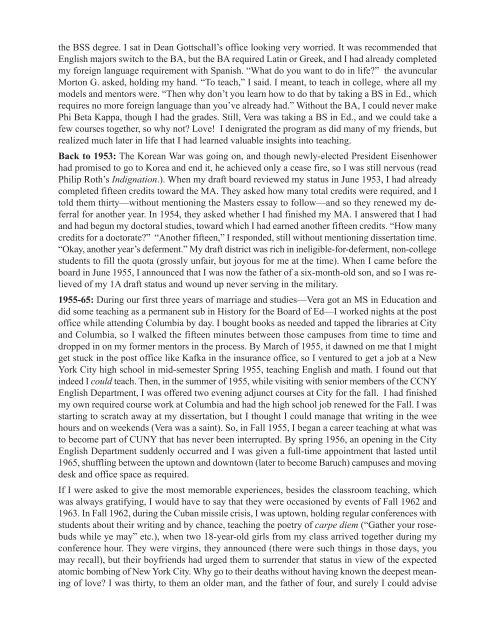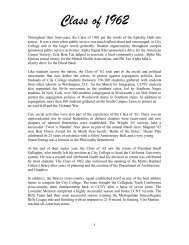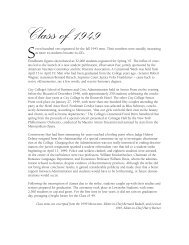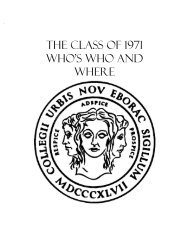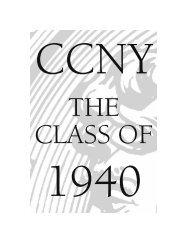Alan Cooper:Dear Classmates,Last week, I told Elena Sturman that I was so busy with teachingand course preparation that I could not possibly find time for a biography.She said that if I changed my mind, I would have to getanything to her by the end of February. Now I have the guilts. Whenyou read this, two or more months from now, you may not rememberthe significance of this date, but it is one of even more importantdeadlines than Elena’s or mine: two days to sequestration, two daysto the resignation of the Pope (with cardinals resigning right andleft), and everybody in Congress or the White House name-callingabout refusals (called inabilities) to meet these deadlines. So, okay,I’m taking three hours during this, my non-teaching day, wedged between two heavy teaching days, totry to hammer out something useful for a biog. What? What valuable perspective do I have that no oneelse among us may have? It occurred to me about half an hour ago that it is that of a CUNY facultymember who has seen the changes in this university (including our <strong>College</strong>) that no one else on the listmay fully understand. I am, this term, completing my 58 th consecutive year as a CUNY faculty member(and I have a deadline this week to hand in suggestions for my course offerings in the fall, the start ofmy 59 th year).Lest I ramble and not make it in three hours, here’s a personal web site that can give you some detailsin crunched form. Just go to Paskudnyak.com and, ignoring everything else, click on my name printedin blue caps. It will get you to my faculty entry at York <strong>College</strong>. (<strong>The</strong> alternative, going to the Yorkwebsite, requires three more steps to reach it—york.cuny.edu., then faculty, then English department,then scrolling down through the faculty list to me, near the bottom, marked Professor Emeritus/ AdjunctProfessor). In any case, here goes. I’ll divide my remarks into six stages, 1949-52 & 3; 1955-65; 1966-92, 1993-98, 1999-2003, and 2003 to 2013.1949-52 & 3: I met Vera in Spanish 1 during our first freshman term, started going steady by secondfreshman term, and married her in 1952. While we were on our honeymoon, the CCNY graduation of1952 listed me as the recipient of <strong>The</strong> Leon Pin, awarded to the senior with the highest average in English.I had no inkling of this until we returned and someone from the English Department called to tellme to pick up the pin (I still have it and have worn it proudly on academic gowns over the years.) Iwas eligible because, technically, I was a senior—a lower senior—for I had accelerated my studies bytaking classes during summers and extra (above 16) credits during several terms. In fact, I had alsotaken Honors English, which the registrar had failed to record on time, so I seemed eligible for ninemore credits approaching my Fall ’53 upper-senior term. When it was all straightened out, I had 137credits, tuition free, by January <strong>1953</strong>. So, I was off to Columbia to start my MA with the money frommy undergraduate NY State Scholarship that had been put away to pay for the Columbia tuition.Prior to entering <strong>City</strong>, I had been tested by supposed experts in career advisement. <strong>The</strong>y had said mystrengths were in law and journalism. My father was a lawyer, though hardly a successful one, and Ibegan at <strong>City</strong> as a pre-law major going for a BSS (Bachelor of Social Science) degree, trying to registerfor Government 1, and failing to get into the course for two semesters because it was full of upperclassmen—I’m sure that most of you had comparable experiences—so I took English 1 (writing) andEnglish 3 (first -half of English Lit) in my lower frosh term and English 2 and 4 in my upper froshterm. By the time I got Gov. 1, I had fallen in love not just with Vera, but also with English, and so Ichanged my major. After my sophomore year the <strong>College</strong> (or the State Board), I decided to phase out
the BSS degree. I sat in Dean Gottschall’s office looking very worried. It was recommended thatEnglish majors switch to the BA, but the BA required Latin or Greek, and I had already completedmy foreign language requirement with Spanish. “What do you want to do in life?” the avuncularMorton G. asked, holding my hand. “To teach,” I said. I meant, to teach in college, where all mymodels and mentors were. “<strong>The</strong>n why don’t you learn how to do that by taking a BS in Ed., whichrequires no more foreign language than you’ve already had.” Without the BA, I could never makePhi Beta Kappa, though I had the grades. Still, Vera was taking a BS in Ed., and we could take afew courses together, so why not? Love! I denigrated the program as did many of my friends, butrealized much later in life that I had learned valuable insights into teaching.Back to <strong>1953</strong>: <strong>The</strong> Korean War was going on, and though newly-elected President Eisenhowerhad promised to go to Korea and end it, he achieved only a cease fire, so I was still nervous (readPhilip Roth’s Indignation.). When my draft board reviewed my status in June <strong>1953</strong>, I had alreadycompleted fifteen credits toward the MA. <strong>The</strong>y asked how many total credits were required, and Itold them thirty—without mentioning the Masters essay to follow—and so they renewed my deferralfor another year. In 1954, they asked whether I had finished my MA. I answered that I hadand had begun my doctoral studies, toward which I had earned another fifteen credits. “How manycredits for a doctorate?” “Another fifteen,” I responded, still without mentioning dissertation time.“Okay, another year’s deferment.” My draft district was rich in ineligible-for-deferment, non-collegestudents to fill the quota (grossly unfair, but joyous for me at the time). When I came before theboard in June 1955, I announced that I was now the father of a six-month-old son, and so I was relievedof my 1A draft status and wound up never serving in the military.1955-65: During our first three years of marriage and studies—Vera got an MS in Education anddid some teaching as a permanent sub in History for the Board of Ed—I worked nights at the postoffice while attending Columbia by day. I bought books as needed and tapped the libraries at <strong>City</strong>and Columbia, so I walked the fifteen minutes between those campuses from time to time anddropped in on my former mentors in the process. By March of 1955, it dawned on me that I mightget stuck in the post office like Kafka in the insurance office, so I ventured to get a job at a NewYork <strong>City</strong> high school in mid-semester Spring 1955, teaching English and math. I found out thatindeed I could teach. <strong>The</strong>n, in the summer of 1955, while visiting with senior members of the CCNYEnglish Department, I was offered two evening adjunct courses at <strong>City</strong> for the fall. I had finishedmy own required course work at Columbia and had the high school job renewed for the Fall. I wasstarting to scratch away at my dissertation, but I thought I could manage that writing in the weehours and on weekends (Vera was a saint). So, in Fall 1955, I began a career teaching at what wasto become part of CUNY that has never been interrupted. By spring 1956, an opening in the <strong>City</strong>English Department suddenly occurred and I was given a full-time appointment that lasted until1965, shuffling between the uptown and downtown (later to become Baruch) campuses and movingdesk and office space as required.If I were asked to give the most memorable experiences, besides the classroom teaching, whichwas always gratifying, I would have to say that they were occasioned by events of Fall 1962 and1963. In Fall 1962, during the Cuban missile crisis, I was uptown, holding regular conferences withstudents about their writing and by chance, teaching the poetry of carpe diem (“Gather your rosebudswhile ye may” etc.), when two 18-year-old girls from my class arrived together during myconference hour. <strong>The</strong>y were virgins, they announced (there were such things in those days, youmay recall), but their boyfriends had urged them to surrender that status in view of the expectedatomic bombing of New York <strong>City</strong>. Why go to their deaths without having known the deepest meaningof love? I was thirty, to them an older man, and the father of four, and surely I could advise
- Page 3 and 4: I think of the Main Building in ear
- Page 5 and 6: HAROLD ADELSON, Ph.D.Liberal Arts &
- Page 7 and 8: Alfred Baker: majored in mechanical
- Page 9 and 10: public school career, was: “It do
- Page 11 and 12: and especially to those who taught
- Page 13: Judge Herman Cahn, B.A., J.D.: was
- Page 17 and 18: shook hands on the appointment, but
- Page 19 and 20: Elaine M. David, M.S.Ed.: studied E
- Page 21 and 22: William G. Drinnan, B.C.E., P.E.: I
- Page 23 and 24: Meanwhile, I was active in communit
- Page 25 and 26: Arthur Freed, B.C.E., P.E., F.N.SPE
- Page 27 and 28: Bernard Jack Gershen, B.E.E., M.S.E
- Page 30 and 31: Norah and I have two daughters and
- Page 32 and 33: Harvey Philip Greenspan, B.S., M.S.
- Page 34 and 35: Ramon Held, B.A., L.L.D.: was a law
- Page 36 and 37: Herbert Hershfang, B.A.: My most vi
- Page 38 and 39: graduate of CCNY. After 56 years, w
- Page 40 and 41: Herb Isaacs: My mother called me He
- Page 42 and 43: David M. Jacobowitz, B.S., M.S., Ph
- Page 44 and 45: I am a Past-President and long-time
- Page 46 and 47: Jerry N. Koral, B.S., Ph.D.: Jerry
- Page 48 and 49: -drolysis pilot plants and built tw
- Page 50 and 51: Fred Lipschitz, Ph.D.: I received m
- Page 52: At Jackson and Tull in Maryland, th
- Page 57 and 58: -sition he held for seven years and
- Page 59 and 60: Paul M. Parker: I was born in 1928
- Page 61 and 62: I was employed as an engineer at th
- Page 63 and 64: Edward S. Plotkin, B.E., M.B.A., P.
- Page 65 and 66:
proposed the design of communicatio
- Page 67 and 68:
labs in New York City. He said “N
- Page 69 and 70:
›son), Brigadoon (Charley Dalrymp
- Page 71 and 72:
A moment at City stands out in Bern
- Page 73 and 74:
-gram, as I couldn’t take the sam
- Page 75 and 76:
Eugene Sklar: I was born and raised
- Page 77 and 78:
Jerry Somerdin, B.S., M.A: was a ma
- Page 79 and 80:
Dr. Herbert Weissbach: I graduated
- Page 82 and 83:
Professor Stanley A. Wolpert, B.A.,


